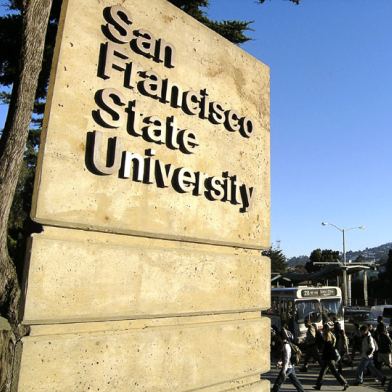 San Francisco State University students and teachers held a public discussion Tuesday afternoon to respond to the momentous uprising in Egypt.
San Francisco State University students and teachers held a public discussion Tuesday afternoon to respond to the momentous uprising in Egypt.
Today’s event came as Egyptian President Hosni Mubarak announced he will step down when his term ends in September. Protesters have called on Mubarak to leave office immediately.
The developments in Egypt have stirred interest and questions from the school community, and today’s meeting was meant to address those, organizer Mira Nabulsi said.
The Arab world was shaken last month when protests in Tunisia forced President Zine el-Abidine Ben Ali to step down. Protests in Egypt and other Arab countries followed.
“It looks like this is going to be the beginning of a bigger change in the Arab world,” Nabulsi said. “The barrier of fear that existed before is being challenged.”
Today’s speakers included professors who specialize in the politics and culture of the Arab world and SFSU students from Egypt. They discussed the history of the region, the recent protests, the response in Bay Area communities, and U.S. foreign policy.
During the event the roughly 50 attendees sat on chairs, couches and even the floor before a panel of speakers, all trying to make sense of what was going on overseas.
The event began with a live news feed from Al Jazeera, followed by Egypt’s national anthem.
“I’m really excited about this moment,” ethnic studies professor Jason Ferreira said.
Ferreira said the uprising in Egypt is historic.
Speakers also discussed the impact of the Internet and social media in the recent uprisings.
“I think (social media) helps a lot, but it was people coming out into the streets that toppled the regime in Tunisia. We need to give credit to those people,” Nabulsi said.
“They’ve moved from behind the screens to the streets. That’s why the use of social media has been successful.”
Omar Ali, an SFSU junior majoring in history who left his native Egypt when he was 17, was also on the panel.
Now 21, Ali returned from Egypt a few weeks ago, his first trip back in three years.
He shared a few of his observations.
“Inflation has hit 50 percent,” he said, noting that the cost of bread, wheat and oil have all gone up.
Ali admitted that he wished he were home to take part in the uprising.
He said he’s doing his best to support the efforts of the protesters, including participating in demonstrations.
“Solidarity–that’s the most important thing we can do here in the U.S.,” he said.
With that, Ali urged attendees to participate in a march scheduled for Saturday at 1 p.m. in San Francisco’s United Nations Plaza.
One of the event’s other speakers, SFSU professor Mohammud Salama, said he too will participate in Saturday’s rally.
The Answer Coalition held a rally last Saturday at Market and Montgomery streets, and supporters came out in abundance.
“It exceeded our expectations,” organizer Ali said. “About 1,000 people came out, and they came out with a lot of compassion and solidarity with the people.”
Saturday’s march will proceed along Market Street, and organizers hope it will help raise awareness.
“This is a humanitarian issue. Thirty years of one ruler is enough,” Ali said.
Tuesday’s meeting was organized by the Arab and Muslim Ethnicities and Diasporas Initiative, or AMED, through SFSU’s College of Ethnic Studies.
Want more news, sent to your inbox every day? Then how about subscribing to our email newsletter? Here’s why we think you should. Come on, give it a try.









